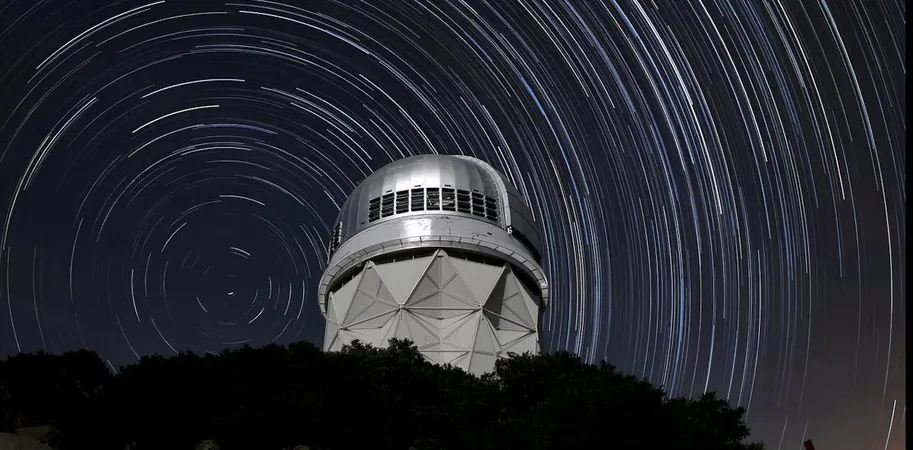
Revolutionary Dark Energy Findings: Is the Universe More Dynamic than We Thought?
2025-04-16
Author: Wei
Unlocking the Mysteries of Gravity and Dark Energy
Gravity, the force that keeps us anchored to Earth, isn't just about pulling things in. Since the 1990s, astronomers have unearthed a groundbreaking fact: the universe's expansion is accelerating. This revelation hints that gravity might do more than attract—it can also push.
The Enigma of Dark Energy
Dark energy, a term for the mysterious force driving this cosmic acceleration, has puzzled scientists for decades. Traditionally, it's thought of as a constant energy filling the void of space, unyielding as the cosmos expands. However, quantum mechanics paints a different picture, suggesting that even so-called empty space is teeming with fleeting particles. Yet, a simple 'constant dark energy' has dominated our understanding, aligning well with numerous cosmological observations.
New Discoveries from the DESI Collaboration
Recent groundbreaking measurements from the Dark Energy Spectroscopic Instrument (DESI) challenge this longstanding narrative. Unveiled in March 2025, these findings suggest the universe was expanding at a quicker pace—up to 3% faster—several billion years ago. This could mean that dark energy used to be 'springier,' influencing cosmic repulsion more dynamically than today.
Mapping the Cosmic Landscape
How do we know this? Astronomers harness the light traveling across time and space. DESI, which scrutinized the light from over 14 million galaxies, created a 3D map that traces cosmic history over 12 billion years. By measuring a subtle cosmic feature from sound waves that rippled through the early universe, DESI revealed insights into how dark energy has evolved.
Exciting Evidence for Change
The compelling findings from DESI come from pairing its redshift information with density measurements from the European-led Planck mission. The results favor a model of evolving dark energy, boasting a statistical significance unmatched in recent studies, making the notion of constant dark energy seem increasingly questionable.
The Promise of Future Discoveries
Despite some skepticism in the scientific community, especially from conflicting reports, the data from DESI—and supplementary insights from supernova observations—hint at a transformative understanding of dark energy. If the evidence stands firm, it could radically reshape our theories, suggesting dark energy not only changes but does so rapidly, especially at key moments in cosmic history.
A Marvel of Modern Science
DESI is a shining example of modern 'big science.' Located at the Kitt Peak National Observatory, this ambitious instrument comprises 5,000 optical fibers that continuously map the universe, reflecting the collective efforts of over 900 scientists from 70 institutions. Each night, DESI shifts its gaze, capturing data that could redefine our comprehension of the universe.
A Bright Future Awaits
If the findings from DESI are validated, they will join an impressive roster of 21st-century breakthroughs, including the discovery of gravitational waves and magnificent insights from NASA's James Webb Space Telescope. These advances highlight the incredible feats possible through dedicated scientific inquiry funded by public support.
 Brasil (PT)
Brasil (PT)
 Canada (EN)
Canada (EN)
 Chile (ES)
Chile (ES)
 Česko (CS)
Česko (CS)
 대한민국 (KO)
대한민국 (KO)
 España (ES)
España (ES)
 France (FR)
France (FR)
 Hong Kong (EN)
Hong Kong (EN)
 Italia (IT)
Italia (IT)
 日本 (JA)
日本 (JA)
 Magyarország (HU)
Magyarország (HU)
 Norge (NO)
Norge (NO)
 Polska (PL)
Polska (PL)
 Schweiz (DE)
Schweiz (DE)
 Singapore (EN)
Singapore (EN)
 Sverige (SV)
Sverige (SV)
 Suomi (FI)
Suomi (FI)
 Türkiye (TR)
Türkiye (TR)
 الإمارات العربية المتحدة (AR)
الإمارات العربية المتحدة (AR)